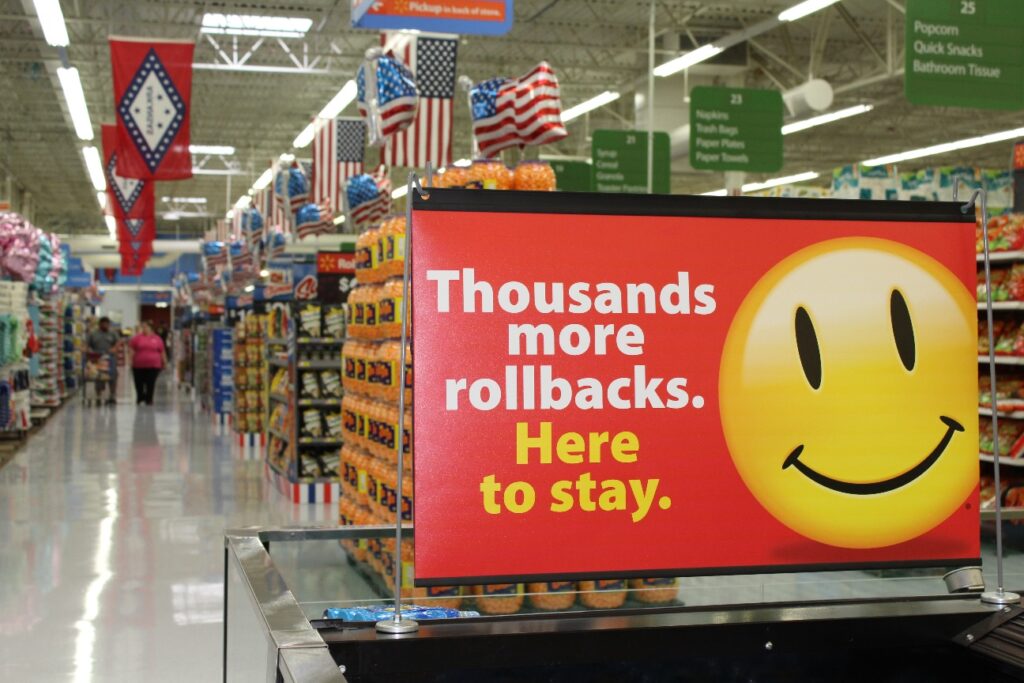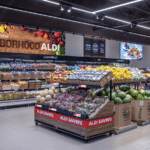Walmart prides itself on being the low-price leader. But soon, those prices may not be quite as low.
Walmart released strong quarterly financial results this morning. But it warned of financial difficulties ahead – for itself and its customers – if the U.S.-China tariff fight isn’t resolved soon.
“We’re monitoring the tariff discussions and are hopeful that an agreement can be reached. Our goal is to always be the low-price leader, and we will actively manage pricing and margins as warranted,” Chief Financial Officer Brett Biggs said in a statement this morning.
More bluntly, “we will do everything we can to keep prices low, but increased tariffs lead to increased prices,” he elaborated in an interview with Bloomberg. “There are some places where, as we get tariffs, we will take prices up.”
It’s a similar worry that other retailers have expressed. But as the largest retailer of them all, what Walmart does will be closely watched – and likely matched – by competitors.
Led by groceries, Walmart sources about two-thirds of its items domestically. So its food prices are unlikely to be severely affected during the trade fight. But a third of its items throughout the rest of the store are sourced internationally, including from China, leaving Walmart vulnerable to higher tariffs that it may be forced to pass along to its shoppers.
Walmart has been warning about this for a while. Back in September, the company sent a letter to U.S. Trade Representative Robert Lighthizer, saying it was “very concerned about the impacts these tariffs would have on our business, our customers, our suppliers and the U.S. economy as a whole.”
“Walmart customers will face cost increases for essential items like car seats, cribs, backpacks, hats, pet products and bicycles,” the letter warned. “For lower-income families, a 25% tax on these items would be a serious burden on household finances.”
The letter concluded by saying that “either consumers will pay more, suppliers will receive less, retail margins will be lower, or consumers will buy fewer products or forego purchases altogether.”
Its warnings about higher prices come as Walmart reported a rise in the amount of money that each shopper spent this past quarter. Higher prices could reverse that trend, if more shoppers decide to forego purchases of products impacted by the tariffs. Biggs said shifting the sourcing of some products from China to other countries “is one of a number of actions that our merchants are considering”.
In an unrelated bit of bad timing, Walmart officially mothballed its Savings Catcher price-match program this week, as it had announced it would earlier this year. So shoppers who relied on the tool to guarantee that they always got the lowest price, may already be facing higher prices at Walmart by not being able to match other stores’ discounts.
But if other retailers follow Walmart’s lead and respond to the tariff fight by raising prices, even price matching may not be enough to insulate shoppers from the ripple effect.
Supporters of the tariffs and the ongoing trade negotiations have portrayed this period of uncertainty as short-term pain for long-term gain. But if retailers follow through on raising prices, you can bet shoppers will be watching closely to see if those prices are lowered again if and when the trade fight is resolved.
So keep an eye on those prices the next time you shop at Walmart. Because it seems the low-price leader may not be able to keep all of its prices low for much longer.
Image source: Walmart















Walmart has already raised prices on everything. Additionally, when a high value coupon and a rebate are in sync, Walmart will raise the price of that item until the coupon expires. Recently the Innovasian bowls were raised from $2.97 to $3.97 for the duration of the coupons and an Ibotta rebate. Tyson Anytizers were also raise from $6.97 to $8.97 for the duration of the $1.50 coupon in sync with a $1.50 Ibotta rebate. I checked last week and both items prices were back to their original prices. Walmart will also pull products when they don’t want to accommodate couponers. Assumption is that getting reimbursed for the coupons is not worth the time based on the % offered by the company. Don’t ask me where I heard that, cause I won’t tell you.
On a personal note; I’m not really for any tariff because it does mean higher prices passed on to you and me. However, I am tired of poor quality merchandise taking over the shelves in our stores. The message should be that Walmart should be supporting the development of AMERICAN MANUFACTURING IN AMERICA not products made in foreign countries. My own personal experiences with purchases from China have be disappointing. They lie about their products, are poor quality, and are often just junk. We currently have way-too-many junk stores operating in the US.